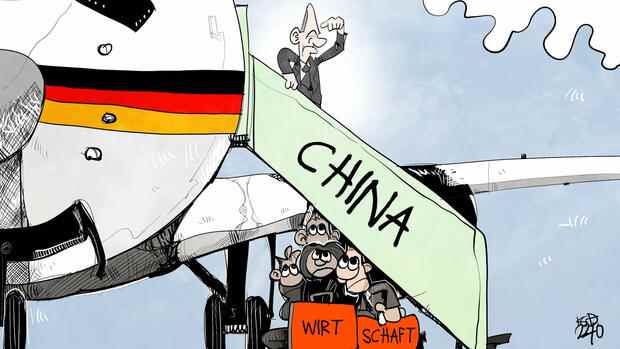(Photo: Kostas Koufogiorgos)
During the Chancellor’s last visit to Beijing, all CEOs wanted only one thing: to get into the Chancellor machine and be as close as possible to Angela Merkel and the powerful in China. Since there were not enough seats in the plane, the industry bosses even flew behind in their private planes.
Next week, when Olaf Scholz leaves for China’s head of state and party leader Xi Jinping, everything will be different. A number of managers have important appointments and are canceling invitations from the Chancellery. The big business with China is still tempting. But when it comes to China’s zero-Covid strategy, the Taiwan conflict or the Beijing-Moscow relationship, a despondency spreads among the bosses that is unknown in the business world.
There are four reasons why every CEO should sit in the machine:
First: CEOs are all capable of forming informed opinions on all of these issues. They also have entire departments in their corporations that deal with geopolitical scenarios. So there is no lack of knowledge.
Top jobs of the day
Find the best jobs now and
be notified by email.
A political debate is something different than showing your skills at a performance show at an industrial fair. But if the management team stays out of it, the economy will disappear from any socio-political discourse that shapes opinions and influences political decisions.
>> Read also: German business has little desire for a “day trip” to China
Secondly: German companies, including large medium-sized companies, need not be ashamed of making money in China. You just have to explain it to people. Just as there are good reasons why China should participate in the Port of Hamburg.
However, hardly any manager dares to say on a talk show that his company simply cannot afford to shut down its business in China immediately. But if no business representative does it, the general public may only listen to those who are not necessarily the most knowledgeable about China.
Third: The business argument that you are in a sandwich position between the US and China is correct. However, it is no longer enough to simply fly under the radar in order to be able to continue doing business on both sides. An export economy like Germany must be prepared if the USA and China decouple from each other. This requires a strong voice that also leads this geopolitical debate in public. The prosperity of the country and thus millions of jobs depend on it.
Fourth: Employees and customers want to know what the company stands for. The corporations, in particular, invest enormous sums in order to advertise their “purpose” on the market and to retain employees. You can’t maneuver your way through it, you have to stand by your values.
The CEOs represent a variety of stakeholders, such as employees or suppliers. Anyone who can speak for these groups in the company with all their differences should not shy away from the public.
Only the “political CEOs” are missing, who take a stand and generate attention. A job advertisement would look for the “Foreign Minister of German Economy”. Probably not the youngest business leaders should succeed Joe Kaeser or Franz Fehrenbach, who with all their experience could assess globalization and its consequences like no other. But a BASF boss Martin Brudermüller or Martina Merz from Thyssen-Krupp would certainly have what it takes. They just have to trust themselves.
More: Dispute over port deal continues – Cosco warns: “No guarantee that the transaction will take place”
